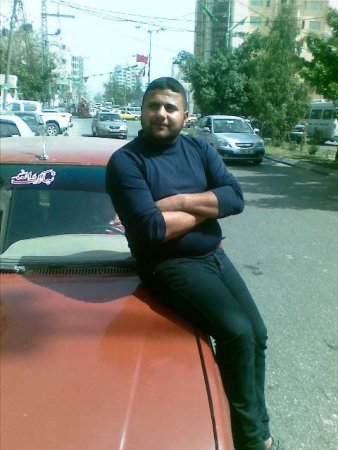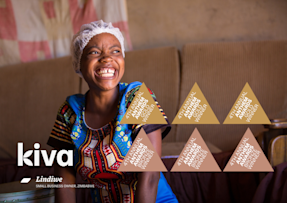Providing loans in the Palestinian Territories is clearly very challenging. The people who live there face both high levels of poverty and scarce employment opportunities. Given this environment, we at Kiva are pleased to work with responsible and effective partners to deliver loans in both the West Bank and Gaza.
Today, we work with two of the most impactful microfinance institutions in the region, and Kiva lenders have made over $5 million in loans to more than 2,800 borrowers with their help. Noman (pictured below) is one of them who was able to improve his livelihood.

Meet our partners
Palestine for Credit & Development (FATEN) has been a Kiva field partner for nearly four years -- a long time relative to our organization’s 7-year history. Initially, it focused only women entrepreneurs but is now working with men to expand financial access in marginalized communities.
That said, FATEN’s mission is about more than financial support. In addition to offering credit, it has humanitarian, environmental, educational, and health initiatives. Borrowers are also encouraged to attend trainings in financial literacy and accounting to help them strengthen their economic base. These services pay special attention to women and young people, who often don’t have as many opportunities. In fact, 80% of all FATEN borrowers to date have been women.
Our other partner serving Palestinian borrowers is Ryada -- one of the largest microfinance providers in the West Bank and Gaza. Its name means “pioneer,” and its portfolio consists of mostly housing loans, small business loans, youth loans, and loans for household needs designed for low- to moderate-income borrowers. Specifically, it targets borrowers who have no access to credit through commercial banks (a commitment it has in common with Kiva).
To date, the institution has disbursed over $100 million in loans, improving housing for over 15,000 families and helping grow 6,200 small businesses -- an incredible feat in a region with 20% unemployment. In recent years, Ryada has achieved a lot, including 15% portfolio growth while maintaining a 98% repayment rate. According to MIX Market, it’s on a mission to double its portfolio by expanding its outreach and finding more external investors.
Reaching vulnerable borrowers
Women are often disproportionately impacted by poverty. A growing number of Palestinian women are receiving university educations and looking to play active roles in the Palestinian workforce, but they often find it difficult to find jobs due to gender and cultural norms. With 42% of Kiva loans in the Palestinian Territories going to female borrowers, Kiva is proud to partner with MFIs who seek to help women overcome the obstacles they face. You can lend to a Palestinian woman here.
As you can see, photos for women borrowers on Kiva usually feature their husbands in the Palestinian Territories. This speaks both to borrower privacy as well as cultural standards that women must confront and conform to when accessing credit.
Young people are another group that struggles in the region’s economy -- a problem exacerbated by skewed age demographics. In the West Bank, 34% of the population is under 14 years old, and that number spikes to 43.5% in Gaza. With limited jobs available, thousands of young people find it impossible to make a living or support their families. Together, Ryada and FATEN have made close to 500 loans to help youth start and grow businesses, jumpstart their income, and build brighter futures. You can lend to Palestinian youth on Kiva here.
In addition to social and economic hurdles, borrowers living in the Palestinian Territories also come up against harsh growing conditions. Many farmers in the region have had agricultural infrastructure damaged or destroyed, have lost access to land and water resources, or have had trouble shipping their goods to market. To give you a sense, the regions agricultural sector used to contribute nearly 50% of GDP in the 1970s. Today, it supplies just 6.2%. You can lend to a Palestinian farmer here.
Specialized loan products
Housing loans have proved to be important for a variety of populations. You can read more about why they can be so vital to families here. And in the Palestinian Territories -- particularly Gaza -- housing loans have become absolutely critical.
The political situation in the region has resulted in widespread property damage. It has also made it difficult and expensive for households to obtain construction and building materials for repairs.

Take, for instance, FATEN borrower Somaia (pictured above with her husband). A married mother of three children all under 10 years old, she works in a sewing workshop to supplement her husband’s income from Palestinian Medical Relief. Amazingly, the couple has managed to start building their own home in their home city of Jenin. But the construction costs are consuming the lion’s share of their income. A Kiva loan of $3,000 helped them finish their home, and they repaid on time.
At FATEN, housing improvement loans account for a large 12% of its total portfolio. These loans are offered up to $15,000 with 6-month grace periods to help families get back on their feet before they are required to repay. As for Ryada, as of May 2012, it had succeeded in improving homes for 15,000 families while developing businesses for 7,500 families. The organization even found that 42% of every dollar spent in the housing sector leads to job creation.
Taxi driving is a common form of employment for many Palestinians. For these individuals, the taxi is absolutely critical to their family’s wellbeing, as taxi driving provides a solid source of employment and is the sole source of income for many Palestinian families. But there are barriers here too. The rising cost of fuel and cars in the region has made finding and keeping work a major challenge.
To address this worrying trend, FATEN and Ryada both offer loans for taxi drivers to purchase their own cars, run independent businesses, and grow their income.
For example, a $1,000 Kiva loan helped Nidal (pictured below) purchase a new engine for his taxi, and a loan of $400 enabled Khaled to cover the cost of insurance and licensing his taxi.

Nidal is the father of a young boy, and losing use of his car could have seriously impacted his family’s wellbeing. There can be many unforeseen expenses in any business -- especially when a household’s livelihood depends on a vehicle, making transportation loans in the Palestinian Territories particularly important.
Borrowers in the West Bank and Gaza are faced with such unique challenges, Kiva is proud to partner with FATEN and Ryada to provide them with opportunities to improve their own lives.
Make a difference where it’s needed most and lend to a Palestinian borrower today.
Have more questions about our Palestinian partners? Send us an email at blog@kiva.org.
PREVIOUS ARTICLE
Cabo Verde, meu Amor →NEXT ARTICLE
Week in Review: Our littlest lenders take over the Kiva office! →














